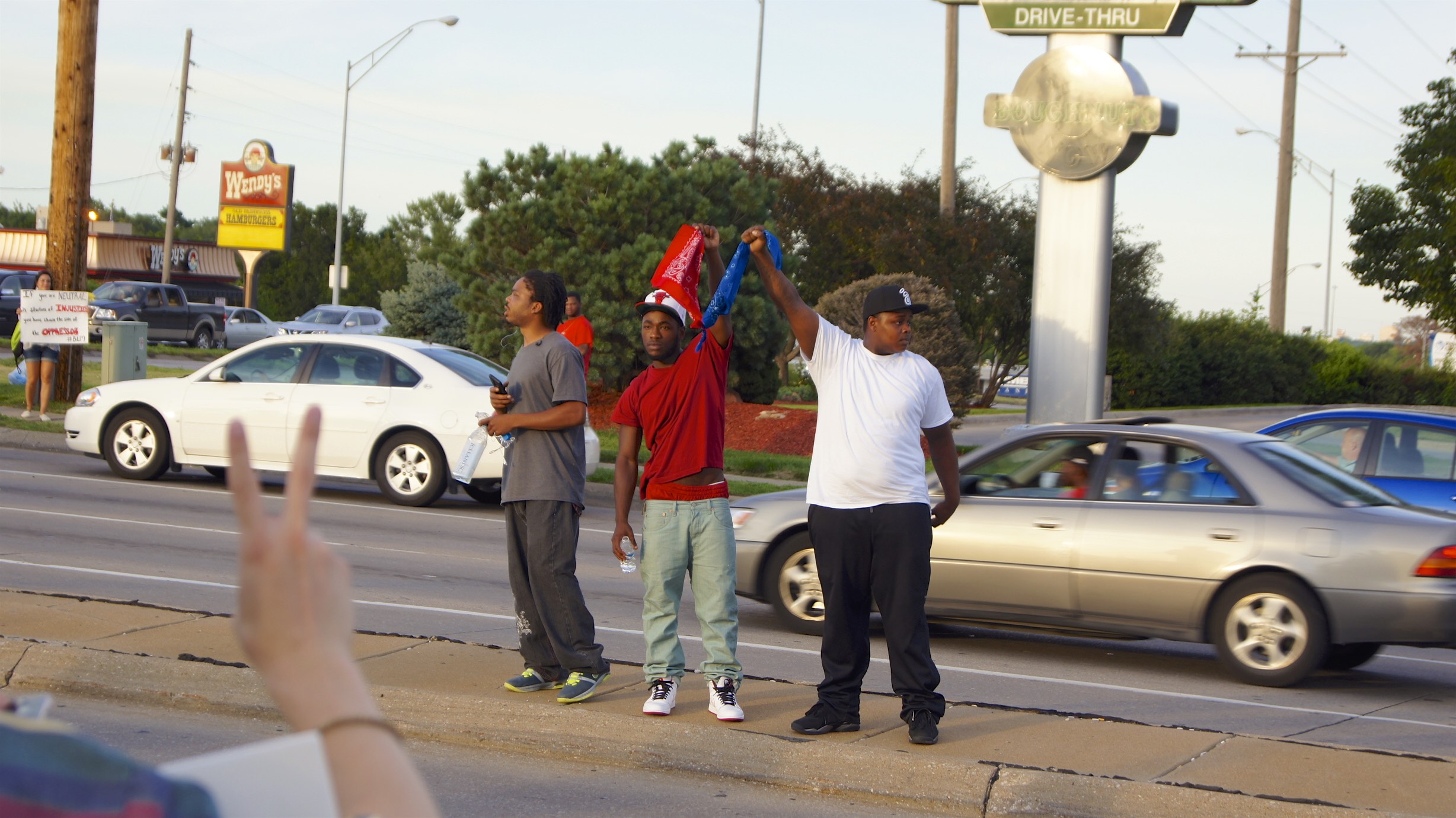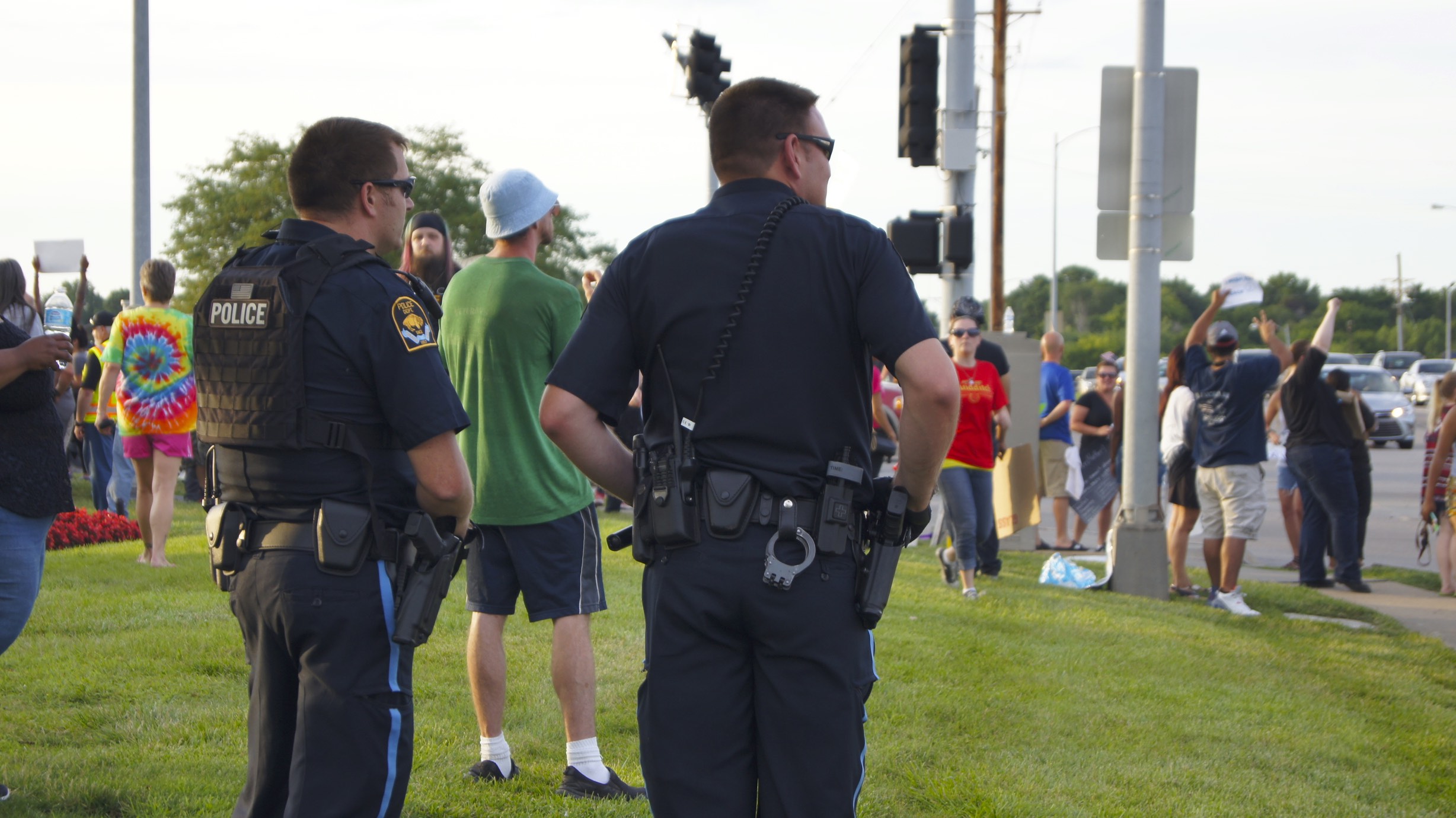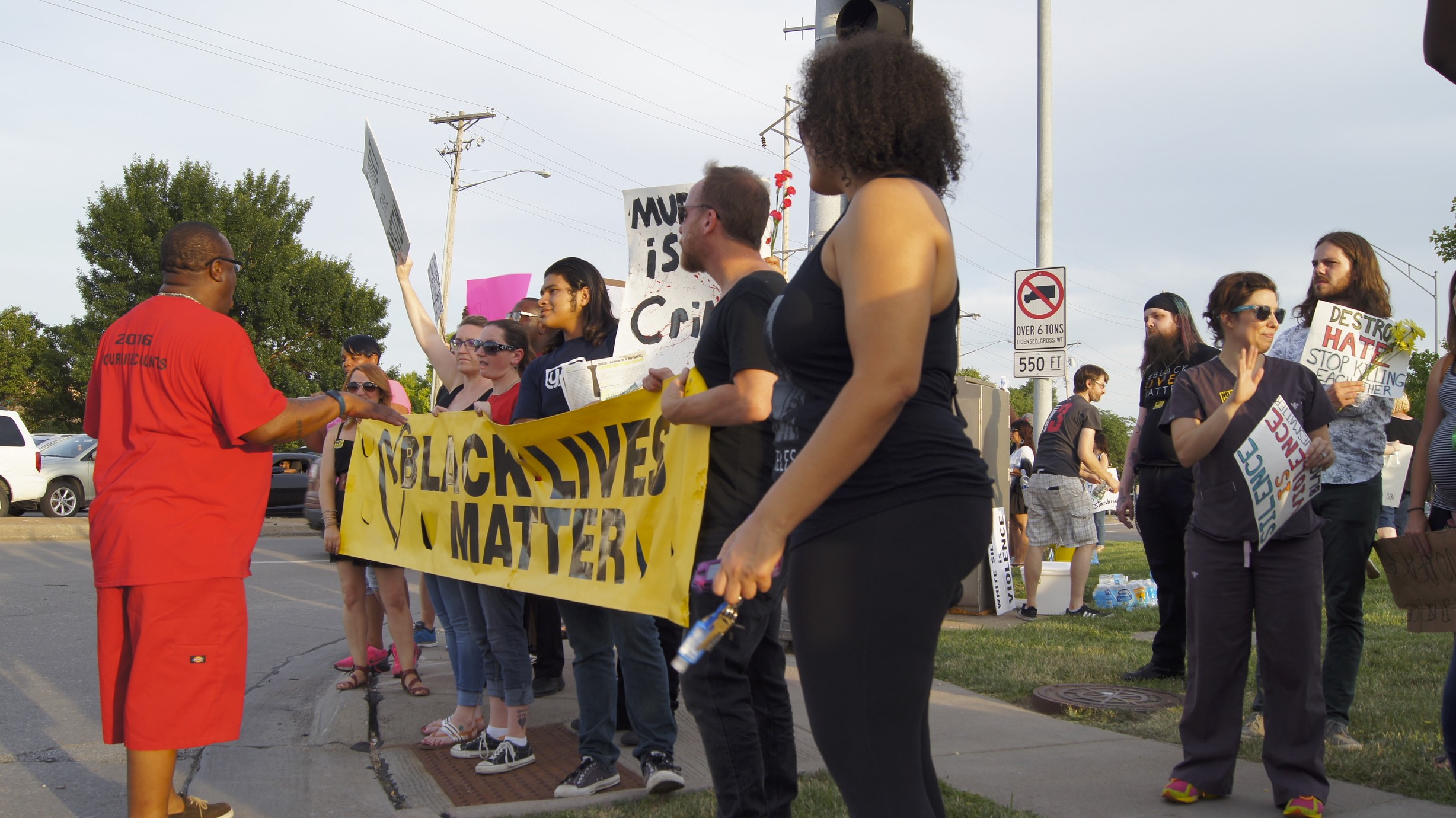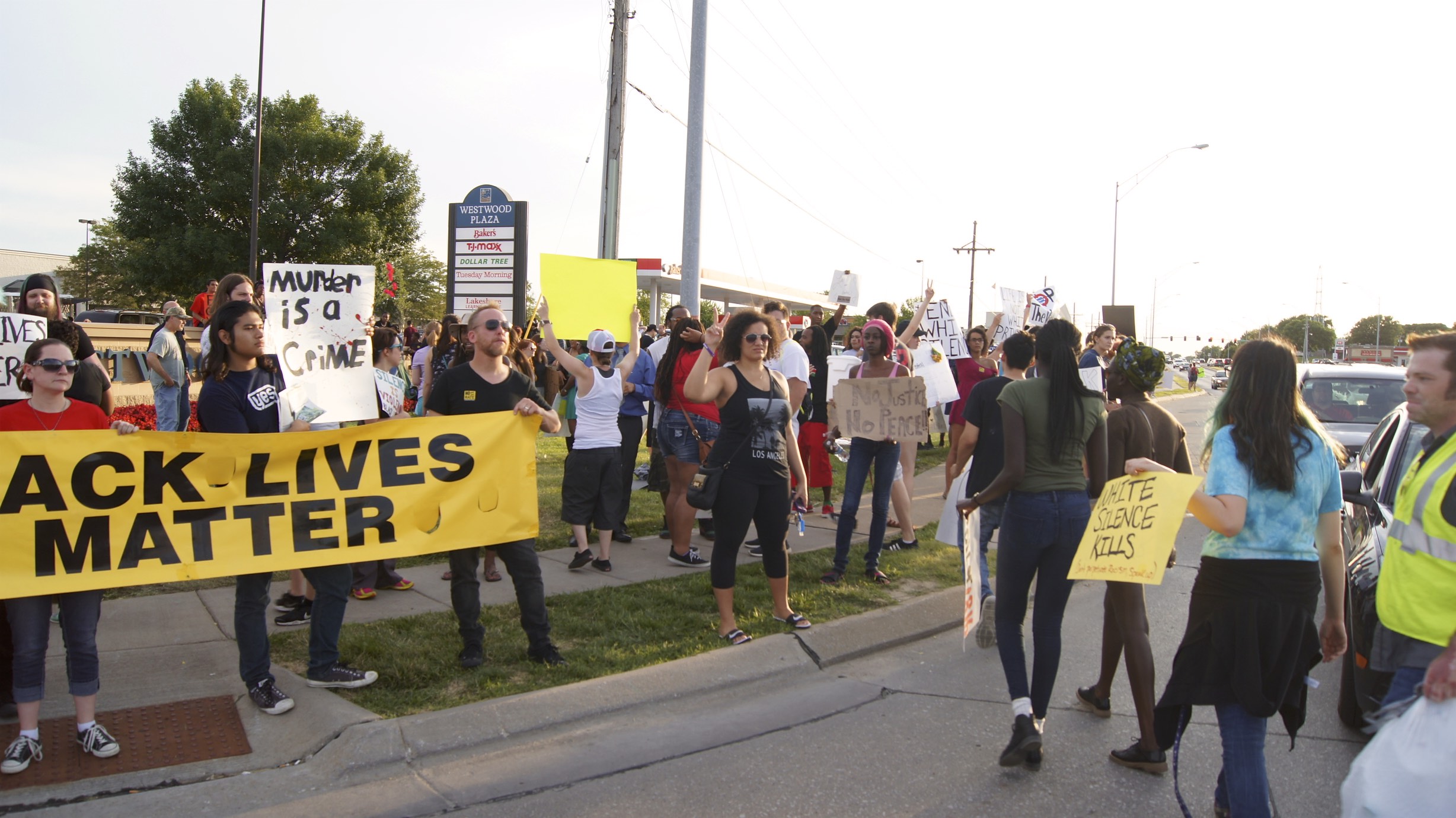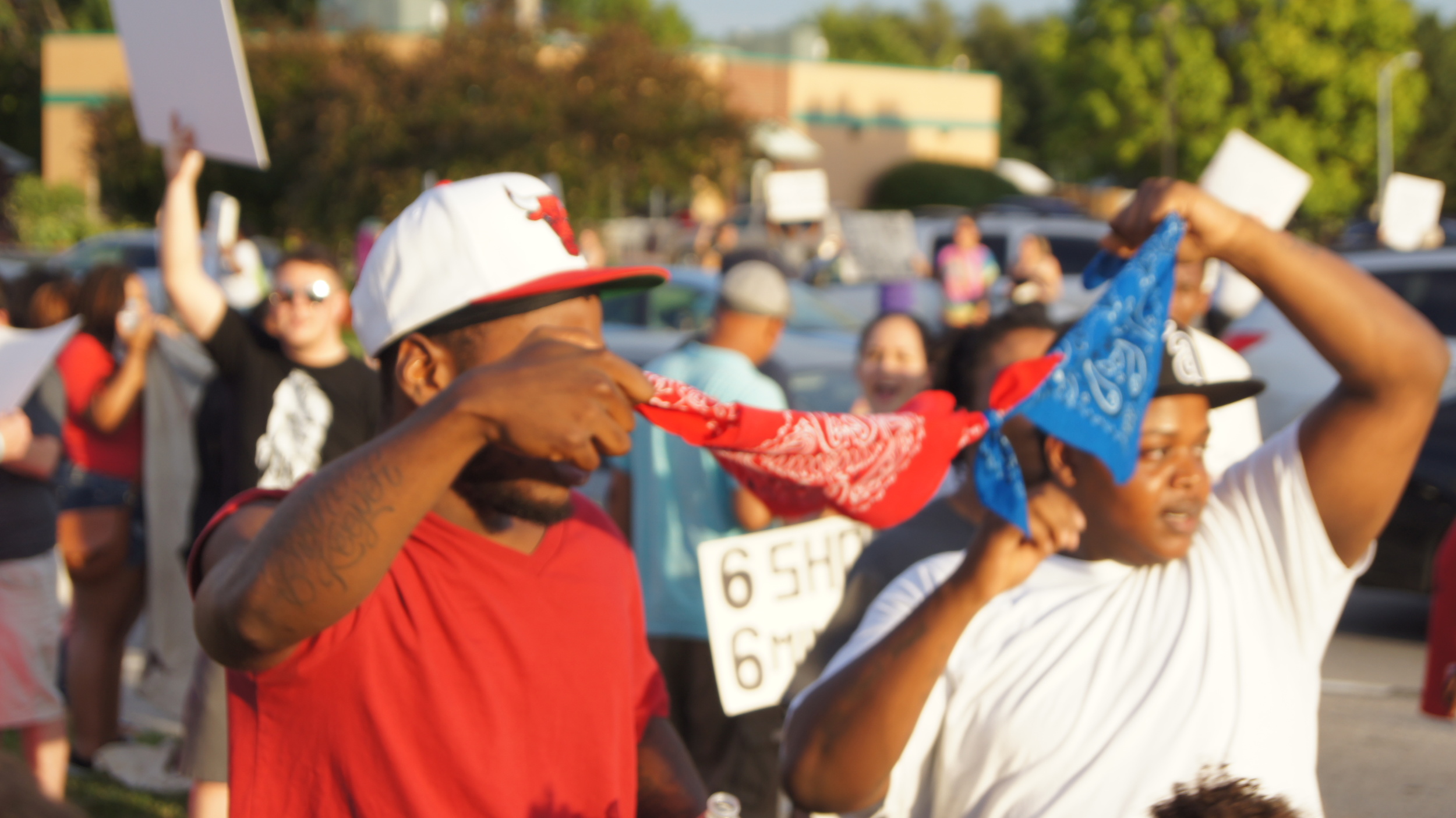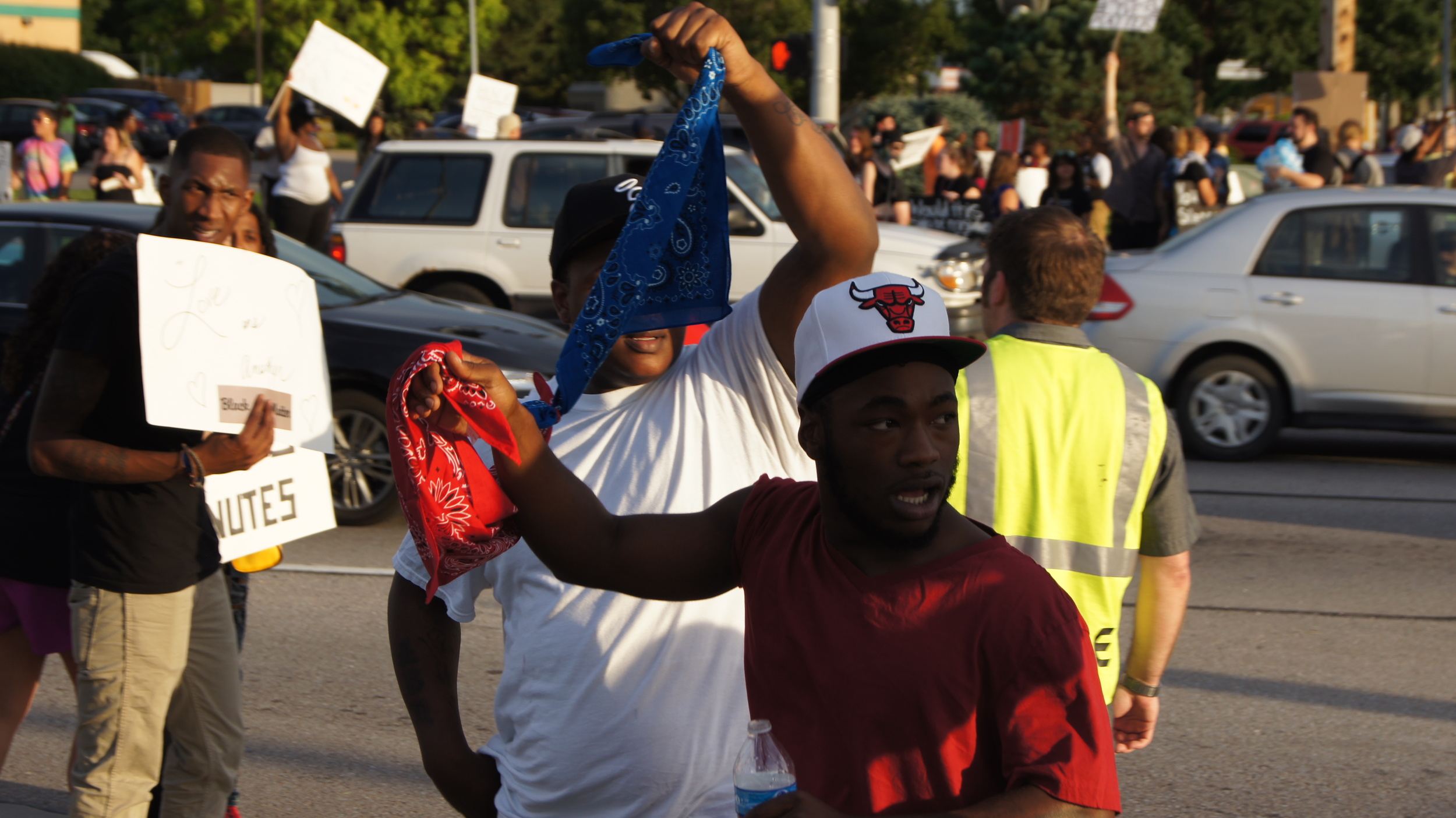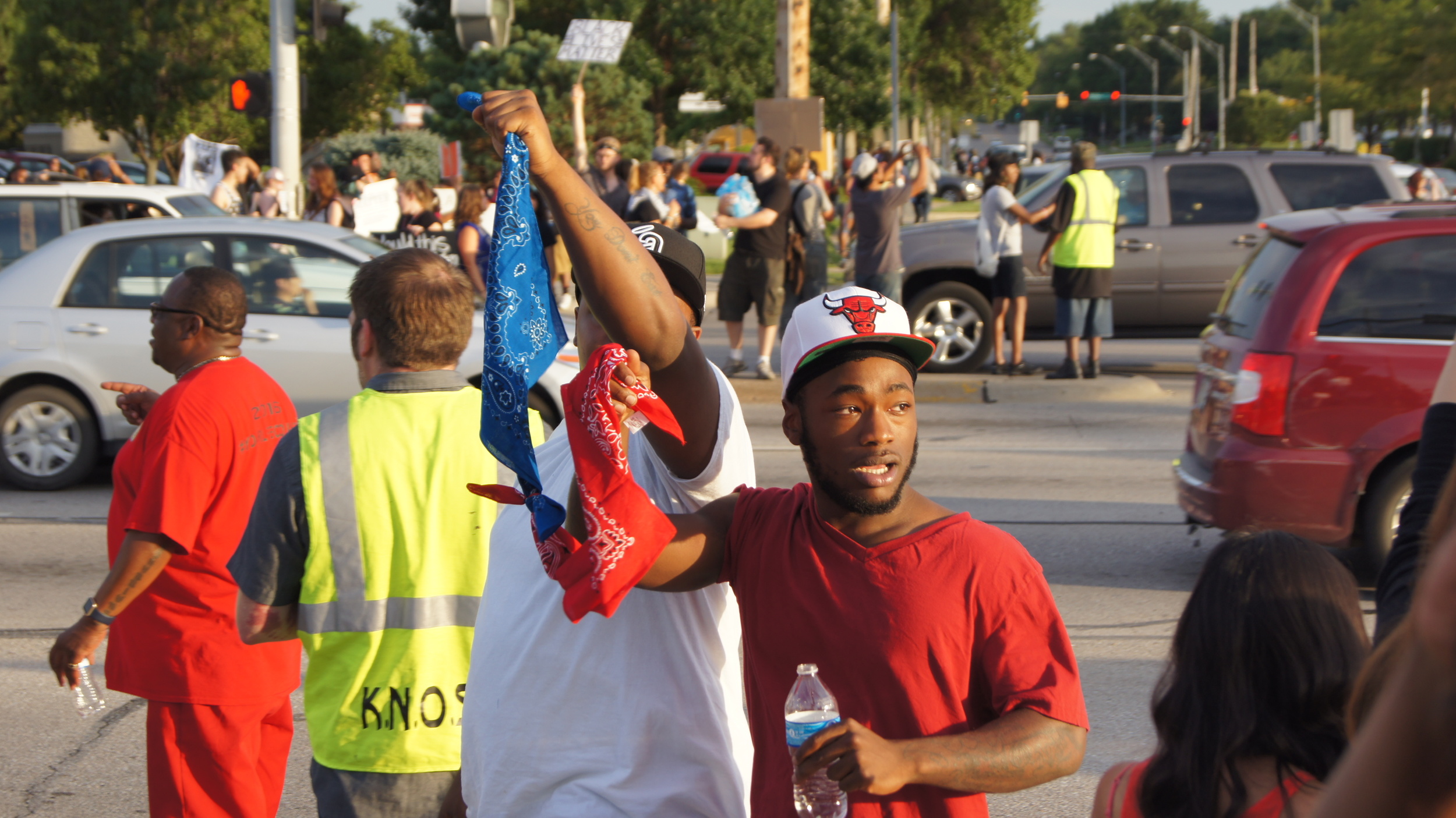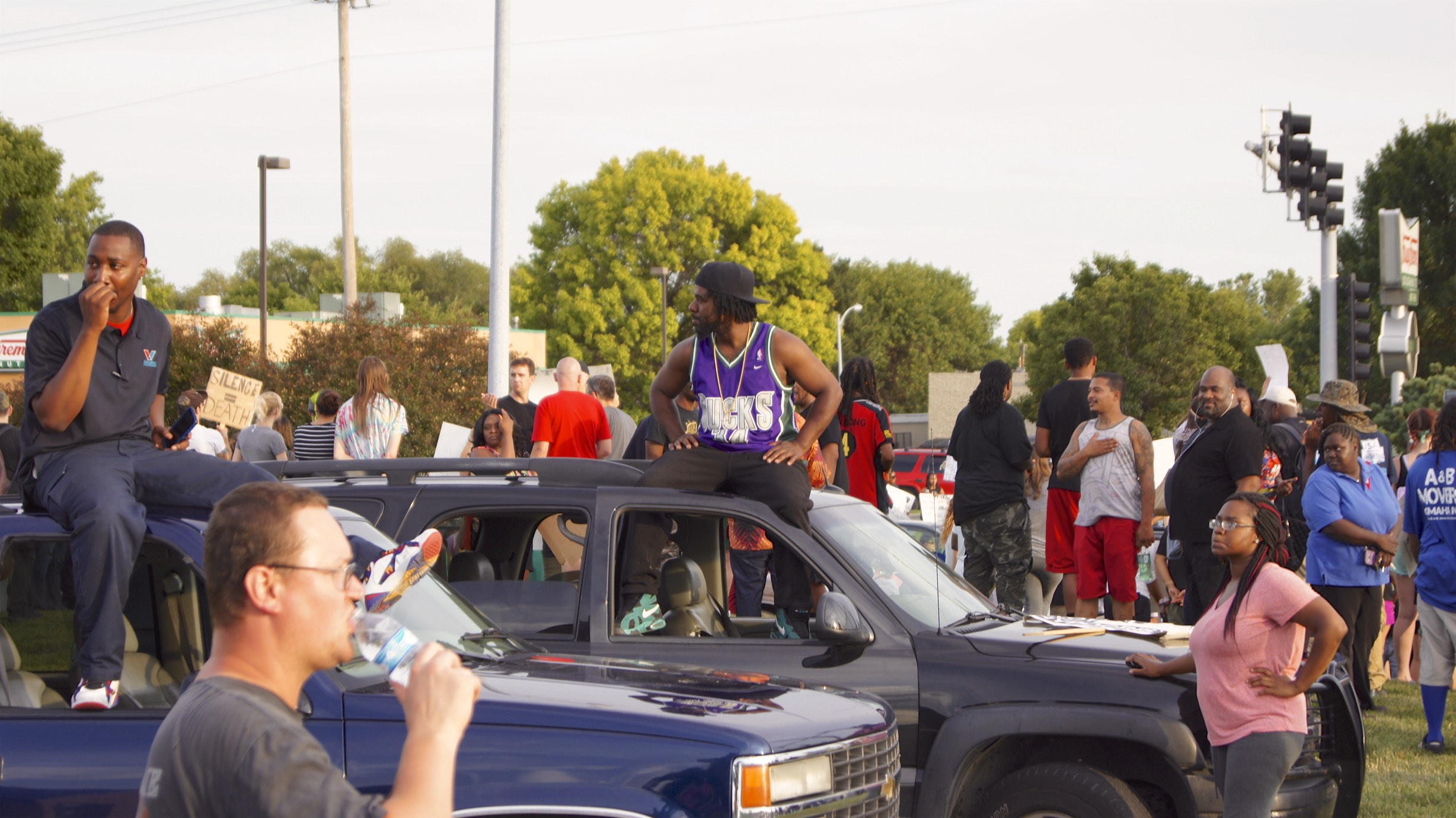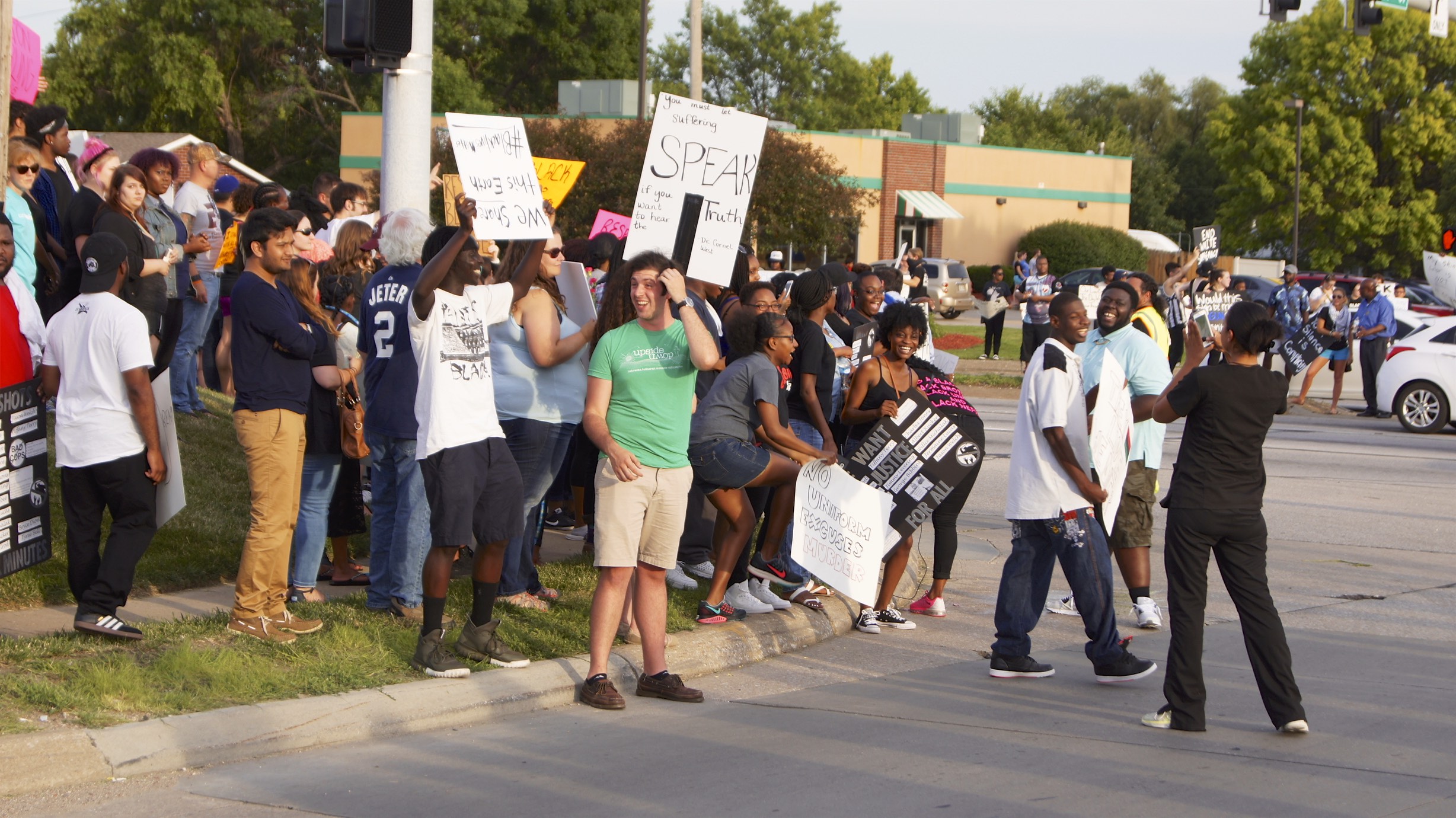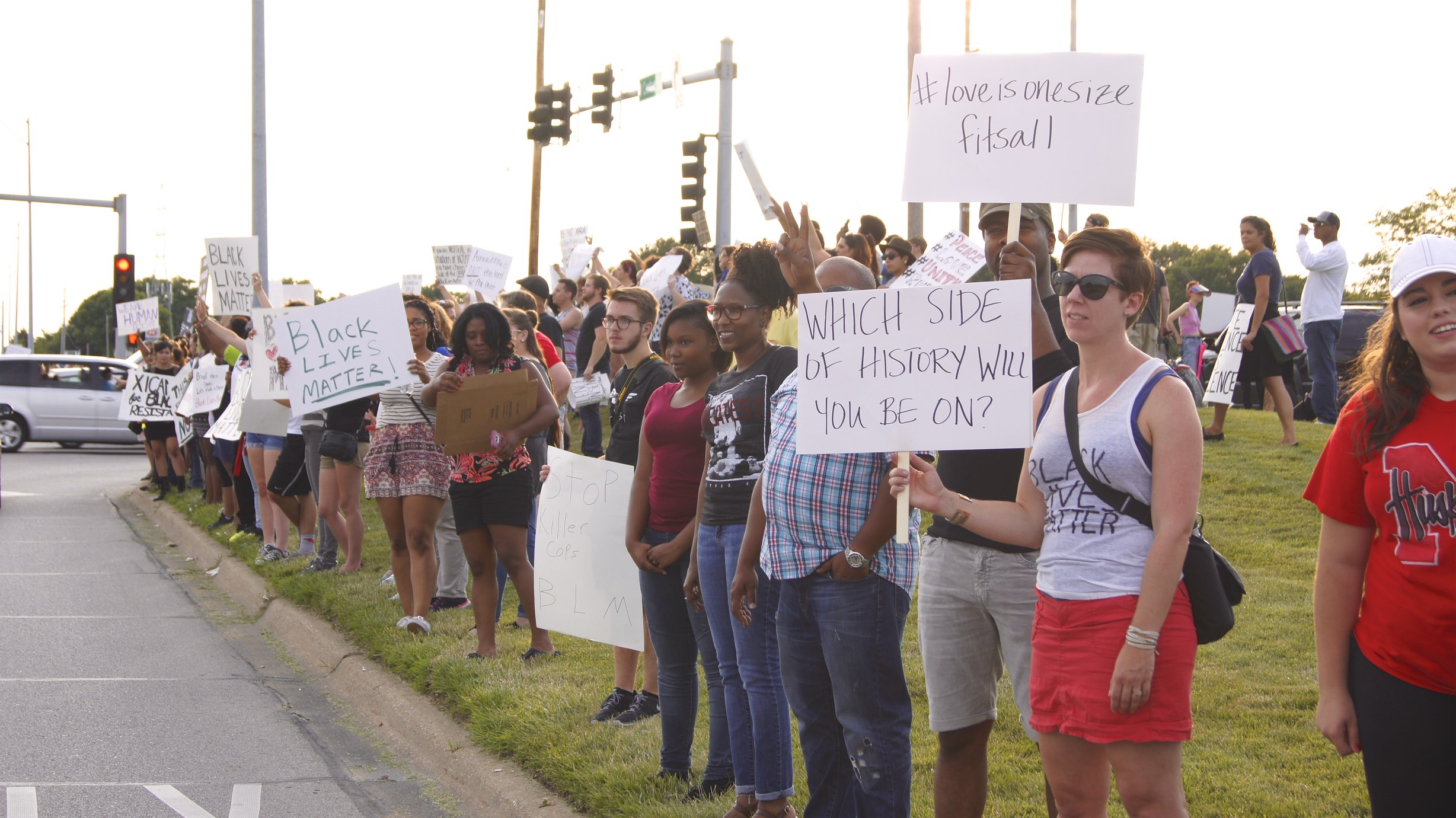#1: Michael Brown was not acting rational
The incident began when Michael Brown and his friend robbed a convenience store (Ferguson Market and Liquor) just blocks away from where the shooting took place. The video from the robbery has been controversial to say the least, but it doesn’t need to be. This video is simply evidence that Brown wasn’t acting like a rational human being, which is extremely relevant considering what happened next.
Upon its release, the video sparked protests from friends, family and supporters of Brown. It was seen as a smear campaign against his character, a way to make him look like a thug. People who knew Brown defended his character by talking about how he was a nice kid and didn’t usually cause any trouble.
There will always be people who look at one incident in a person’s life and define that person by it. Yes, some will choose to label Brown as a thug after watching the video. There are other signs (like his rap lyrics) pointing to the fact that Brown was beginning to dabble in a culture of drugs, sex and violence. None of this means he wasn’t a good person, or at least friendly to the people he knew in his community. He was an 18 year old boy, who had just graduated from possibly one of the worst High Schools in America, trying to become a man, whatever he thought that meant.
Rather than being upset about this video’s release, the people who knew Micheal Brown should rest in the fact that it evidences, by their own accounts, that he wasn’t acting like himself that day. We all have bad days for all kinds of different reasons. I’m not going to speculate as to what caused his irrational behavior (even the psychological experts can only guess at that) but I can explain how I know he wasn’t thinking rationally. Even if he had been known as a hardcore criminal (which he wasn’t), his actions that balmy Saturday morning fall far outside the norm.
Lets start by looking at his behavior at the Ferguson Market and Liquor. Brown enters the store, followed by his friend, and casually walks up to the counter. He then begins reaching behind the counter, grabbing boxes of cigarillos. Rather than getting what he came for and getting out the door, he takes an extraordinarily long time. As someone who has investigated countless thefts and robberies, his behavior here is very strange.
Brown hands the first box he grabs to his friend, Dorian Johnson, who is standing behind him. Dorian seems confused, looking down at the box he’s holding in his hand as if he’s not sure what Brown is up to. Then Brown grabs another box but the cigarillos spill out onto the floor. As Brown takes his time picking the mess, Dorian sets the first box back on the counter and the cashier grabs both boxes.
After collecting the loose cigarillos from the floor, Brown heads for the door; but not before the store owner tries to stop him. Instead of leaving, which he could have easily done, Brown shoves the store owner into a display case by his neck. This is a 6’4”, 289 pound, 18 year old man (at least physically) versus a 5’6”, 150 pound 57 year old geriatric; not exactly a fair fight.
What’s important to note here again is that Brown doesn’t seem to care about getting away with the rising number of crimes he is in the process of committing. Even after he shoves the old man out of the way, he turns around and steps back into the store to further intimidate him, saying something to the effect of “what you gonna do?” Even Dorian Johnson told investigators this behavior caught him off guard because it was out of character for Brown.
After leaving the store, they headed back to the Canfield Green Apartment complex. The normal behavior for someone who just robbed a convenience store would be to quickly leave the area while staying as low key as possible. Brown does just the opposite. He walks, yes walks, from the location of the robbery to where Officer Wilson encounters him on Canfield Drive (The estimated time for someone to walk between the two locations is nine minutes, exactly the amount of time between the initial theft call and Officer Wilson’s contact with Brown and his friend).
Here Dorian noted more strange behavior. As they left the Ferguson Market, he heard the clerk say the police were being called and expected Ferguson Police to be on their way. Brown’s choice to walk down the middle of the street with the cigarillos visible in his hand defied all logic. Even as a marked police cruiser came into their view and drove right past them, Brown chose to keep the incriminating evidence in plain view, as if he was looking for a confrontation with the police. This indicates a lack of concern for the consequences of his actions and a major deviation from normal human behavior.
Dorian wasn’t the only one who noticed things weren't right with Brown. Witness 138 said it would surprise him if Brown attacked a police officer, but was also surprised to see the video from the Ferguson Market, saying it was out of character for Michael Brown. He also noted that Brown was acting out of character in the days leading up to his death. Witness 120 was with Brown the night before. He said they talked a lot about God and the problems they’d been going through and thought it seemed like Brown was “going through a phase.” Witness 130 talked to Brown twice the morning of the shooting. To him, Brown seemed paranoid and aggressive. In his words, Brown “was not in his right mind.”
None of this is a slam on Micheal Brown’s character; in fact, it’s quite the opposite. By all accounts, his behaviors that day weren’t like him at all. Everything about his actions leading up to his death point to the fact that something wasn’t right: his lack of haste in the robbery and getaway, his aggressive behavior toward the store clerk, and his obvious lack of concern for getting caught all support this.
#2: Michael Brown MIGHT Have Been High
According to the toxicology report, Brown had between 11 and 12 nanograms per milliliter of Delta-9-THC in his blood. He had already smoked marijuana and was planning to smoke more (that’s why they were getting the cigarillos).
To provide some perspective, the legal limit of THC in a driver’s’ blood in both Colorado and Washington State is five nanograms; so he was twice the legal limit at the time the blood was drawn. How this level of THC was affecting Brown that day is impossible to know. Just like alcohol (or any other drug really), the affects depend on the person’s individual tolerance, size, brain chemistry, etc. The blood tests also don’t indicate if a the THC was active in his system.
Could this still explain part of his erratic behavior? Yes. The THC in his system could have been affecting his mental processes. Even if it was, people who are high usually don’t exhibit this type of reckless disregard for their own safety and the safety of others. While the THC in his system may have been an accomplice, there was something else going on.
#3: Officer Wilson Was Looking For Lunch, Not A Fight
When the theft call came out on the radio, Officer Wilson was on a rescue call. This is important because when an officer is already handling a radio call, often times they aren’t fully listening to other calls that come out. With their attention divided, officers often miss parts of or entire radio broadcasts, which is exactly what happened. Wilson didn’t hear the correct suspect descriptions and he wasn’t even on the theft call. He did know a theft had occurred and what had been stolen, but he wasn’t exactly on the lookout for the suspects. In fact, he was on his way to lunch with his fiancé.
As a former police officer, I can tell you he most likely wasn’t looking for trouble. He had is “blinders” on, which means he was trying to get to lunch by purposely avoiding criminal activity. When he cleared from the rescue call, he checked with the officers on the robbery call to see if they needed his assistance. They replied that the suspects has disappeared. What they were really saying is, “no, go to lunch,” and that’s where Wilson was headed when he saw Brown and Dorian walking down the middle of the street.
When he first made contact, Wilson claims he politely told them to walk on the sidewalk and continued driving west on Canfield Drive, despite Brown responding with something to the tune of, “fuck what you have to say.” Only when he noticed the cigarillos in Brown’s hand did Officer Wilson realize they were the suspects in the theft call. That’s when he radioed, “Put me on Canfield with two and send me another car.” He then backed up and and angled his cruiser to block Brown and his friend from continuing down the middle of the road.
This in one point in the story where it is unclear how things went down. Johnson claims officer Wilson said, “get the fuck on the sidewalk,” and he responded by politely stating that they were, “not but one minute from their our destination.” There are no other witnesses or evidence to directly support either version of events. What we do know is that Johnson is lying throughout much of his testimony, while Wilson’s testimony has been supported in every area where witnesses or evidence could have discredited it. So the only credible witness who can testify to what happened here is Officer Wilson.
Many think Wilson’s claim that he politely asked them to move to the sidewalk is not believable. But there is nothing to indicate otherwise and, if he was headed for lunch, this is exactly how an officer would act. He also admits that, when he was trying to open his cruiser door, he did say, “get the fuck back” to Brown. He isn’t denying using foul language, just that it was used after the assault already began. As Wilson tried to exit his cruiser, he testified that Brown said, “What the fuck are you gonna do?” This is supported by the fact that Brown said almost exactly the same thing to the Ferguson Market and Liquor store owner just minutes before.
Why is this important? Ferguson is often cited as an example of why black fathers are afraid to let their sons walk down the street for fear of what the police might do to them, as if Officer Wilson decided to shoot Brown because of his skin color. On the contrary, this was not an officer initiated contact. Officer Wilson had reason to detain Brown and Johnson for obstructing traffic (officer initiated) but he didn’t; his blinders were working correctly. He only stopped and confronted the two because he realized they were likely the suspects from the theft call. Not doing so, no matter how much he was looking forward to lunch, would have violated the very oath he took when he became a police officer. Officer Wilson’s decision to take enforcement action was correct and justified with the information he knew at the time.
#4: Brown Was The Aggressor
Police Officers don’t deal with suspects through the window of their cruiser as a rule. When Wilson parked his Tahoe in front of Brown, he tried to open the driver door twice but Brown prevented him from doing so. Again, Wilson and Johnson’s testimonies differ here, but they both agree that Brown prevent Wilson from exiting his cruiser.
Brown then began assaulting Wilson through the driver’s side window, punching the officer in the face repeatedly. Wilson tried to block the punches with his left forearm with only partial success. This was confirmed by multiple witnesses, the presence of Brown’s DNA inside the SUV and on Wilson’s clothes, and the injuries to Officer Wilson’s face and jaw bone. Even Dorian admitted Brown was getting “the best of the officer” despite his claim that Brown never entered the police vehicle.
5. Officer Wilson’s Gun Jammed… Twice!
As the assault went on, Wilson went through his use of force options. Using his mace inside of a vehicle would incapacitate him, leaving him vulnerable to further attack. His baton was inaccessible and would be impossible to use in the confines of his vehicle. His flashlight was out of reach and likely would have been ineffective inside the vehicle as well. The only option left was his gun, a .40 caliber Sig P229.
Wilson drew his weapon and told Brown to stop or he was going to shoot him. Brown replied, “You are too much of a pussy to shoot,” grabbed Wilson’s gun, and pointed it at Wilson’s left hip. Wilson could feel Browns fingers working to get into the trigger guard. Fearing he was about to be shot by his own gun, Wilson struggled to point the gun away from his hip toward the driver’s door, at which point he pulled the trigger. Click. He pulled it again. Click. The gun wouldn’t fire.
This was the first malfunction, if you want to call it that. In fact, there wasn’t anything wrong with Wilson’s gun. As with any semiautomatic pistol, when the slide is out of battery, the gun won’t fire (see this video for an illustration). With Brown pushing the gun toward Wilson while Wilson was trying to turn it away, it is very likely the gun was out of battery momentarily.
Officer Wilson pulled the trigger a third time and the gun went off, firing a round through Brown’s right thumb and into the driver’s door. The shot startled Brown, backing him up off the vehicle. Wilson stated Brown became enraged and “looked like a demon” in response. Brown then leaned back into the vehicle to assault Wilson again. At this point, Wilson tried to fire another round to no avail. Malfunction number two.
Police officers are trained to do what is called a “tap and rack” any time someone else touches their gun, and this is exactly why. When the first shot was fired, the gun was not allowed to cycle properly, most likely because Brown has still holding onto it. Three autopsy reports agreed that Brown’s right hand was within inches of the gun when it was fired. One of those reports indicated that his hand may have been touching the gun when it went off. As he tried to deflect Brown’s second attack, Wilson cleared the jam and fired another round, this time missing Brown.
#6: Officer Wilson Was Alone
After the second shot was fired, Brown took off eastbound down Canfield Drive. Several witnesses stated that Wilson paused after the second shot before exiting his cruiser. Why? Because he was trying to radio for help. I say “trying” because, little did he know at the time, his portable radio had been bumped during the scuffle and was no longer on the correct channel: no one knew what kind of trouble he was in.
This may seem like a moot point, but it does matter. Whether he consciously noticed it or not, he didn’t hear any response when he called out “shots fired” on the radio. The second those words are uttered, a flurry of energetic radio activity typically follows. Even if his mind only made note of this subconsciously, any officer knows the radio silence raises the stakes.
#7: Why did Officer Wilson Pursue Brown?
Police officers are not required, nor should they be, to retreat in the face of certain danger. Their job is to protect the public and enforce the law. Letting a suspect escape because they are bigger, stronger, or just fanatically intent on not going quietly isn’t an option. By this point, Wilson also knew something was terribly wrong with Brown. Letting him go (someone who just robbed a convenience store and assaulted an officer) would put the public in danger.
The other important thing to note here is that Brown was running away when Wilson exited his cruiser. Wilson testified that his intention was to keep Brown in sight until backup arrived. He couldn’t predict the suspect he had just shot would suddenly turn around and charge him. Even if he could, it is not his duty (or within his capacity) to protect a suspect from creating a lethal force encounter. Brown could have obeyed his commands at any time during the altercation; but he didn’t.
#8: Hands Up Don’t Shoot Never Happened
Brown did turn around, though, forcing the circumstances which lead to his own death. Witness’ descriptions of Brown’s actions here vary slightly and this is likely where the “hands up don’t shoot” mantra originated. He may have raised his hands out to his sides briefly, just like he did in the robbery video as he intimidated the store owner, only to ball his hands up into fists and charge at Officer Wilson.
Again, what happens here is another sign that Brown isn’t thinking straight. Wilson stated that Brown appeared “psychotic,” “hostile,” and “crazy.” Brown grunted as he made a slight hop movement with his feet and began charging at Wilson, who’s gun was still appropriately drawn. As Brown began running toward Wilson, his right hand reached down near his waistband, indicating to Officer Wilson he may be reaching for a gun. This is supported by the concentration of bullet holes on Brown’s right and Wilson’s claim that he had tunnel vision (tunnel vision is common in lethal force situations) on Brown’s right hand. Wilson began to backpedal while ordering Brown to stop and get on the ground.
Brown ignored the commands and continued his charge. Wilson fired six consecutive shots. Brown paused briefly and Wilson repeated the commands for Brown to get on the ground. Instead, Brown charged again. Wilson fired one more shot with the same result: Brown paused, Wilson told him to get on the ground, and Brown charged again.
As Wilson continued to backpedal, he fired three more shots, the last of which killed Brown immediately, sending his body crumpling to the ground. The autopsy report indicates this round was fired as Brown was either bent at the waist or falling forward. The abrasions to the right side of Brown’s face also indicate that he was moving forward quickly when he died, not on his knees with his hands in the air, which is supported by every credible witness who saw the final moments of the encounter.
#9: Officer Wilson Was Justified
There are two separate times when deadly force was used and, therefore, must be justified for it to have been legal. The first is when the two shots were fired from the cruiser. The second is out on the street when the remaining ten rounds were fired. In both instances, the physical evidence, autopsy reports, and numerous credible witnesses firmly establish that Officer Wilson was justified in his use of deadly force. From the perspective of a police officer, I can tell you that most officers would have done the very same thing under the conditions.
The first time Officer Wilson used deadly force he was being struck in the face, while in a position of vulnerability, by an undoubtedly stronger and larger person. Only Wilson can say what those punches felt like and it is his perception, at the moment lethal force was used, that must guide any discussion as to its reasonableness. In other words, it doesn’t matter if we can armchair quarterback the incident and come up with other possible solutions. What matters is whether it is reasonable for an officer, under these circumstances, to fear for his/her life and resort to the use of deadly force.
What many people don’t realize is that police officers are trained to treat every call like an “armed party” call because there is always a gun on scene: the officer’s gun. Officers know if they’re rendered unconscious, the suspect will have access to their firearm. Wilson testified to his fear that one more good strike to his head could have knocked him out, leaving him susceptible to further harm. He is not required to wait for that last punch. The use of deadly force while he was sitting in his cruiser was justified.
When Brown turned and ran down the street, the first deadly force incident ended because Wilson’s life was no longer being threatened. The second time deadly force was used is a completely different scenario and must be analyzed independently. This time, both Wilson and Brown are in the street. Wilson is pursuing Brown on foot when Brown suddenly stops, turns, and charges Wilson. At this point, Wilson knows the following:
Brown just assaulted him and grabbed his gun;
Brown knows Wilson is willing to shoot him but is still coming toward him;
Brown is larger and stronger than Wilson;
Brown’s behavior poses a real danger to himself and society.
With this in mind, Wilson started to backpedal, which is significant. Police officers are trained to never backpedal away from a threat. It is a natural fear response to a sudden and unexpected danger and frequently lands officers on their backs in a very vulnerable position. This doesn’t mean Wilson lacked proper training, it means his innate fear response had taken over: he was afraid.
Even if you take away Wilson’s perception that Brown might be armed, the history of their encounter coupled with Brown’s size and obvious intent to harm the officer create a situation where Wilson is justified in using lethal force. It wouldn’t have mattered if Wilson knew Brown wasn’t armed; the physical threat posed by Brown was more than enough justification for the level of force used by Officer Wilson. Some of the credible witnesses even realized this for themselves, making statements like, “[I] would have fucking shot that boy, too,” and “[I] would have fired sooner.” Even from their vantage point of relative safety, they were able to perceive that deadly force was reasonable. In fact, even a civilian in Officer Wilson’s position would have been justified in using deadly force against Brown.
#10: Size Does Matter
They’re both about 6 foot 4 inches tall, but Brown is 289 pounds to Wilson’s 210 pounds. Some have argued that the relative size of a suspect compared to the officer doesn’t matter. This is completely inaccurate. The size of the parties involved in a lethal force situation has everything to do with whether or not deadly force is justified. If you replace Michael Brown with an unarmed, 5 foot 2 inch, 90 pound woman, Wilson absolutely would not have been justified in using deadly force. The suspect’s size speaks directly to the officer’s ability to physical control him/her safely.
This doesn’t mean that big guys can be shot on site by the police; that’s ridiculous. It does mean, however, that someone who tries to physically overpower a police officer is taking a huge risk. Officers aren’t allowed to lose a one-on-one fight because, as history has proven, they are often killed by their own gun once incapacitated. Fighting a cop isn’t like a bar fight, where one person eventually gets the upper hand and the other concedes victory to fight another day. As soon as an officer beings to fear he/she might lose that fight, lethal force becomes a legal option. Agree or disagree, this is not just my opinion; it’s reality. This is how it works and the sooner people accept this, the better.
#11: Ferguson’s Lie was Intentional
With the number of witness accounts, including Officer Wilson’s, that are supported by the physical and forensic evidence, there it little doubt as to what happened in Ferguson. Unfortunately, the community’s support for a false narrative about what happened, one that painted a white police officer as the criminal and the black suspect as the victim, permeated the media’s coverage and the government’s response to this incident.
Many of the false witnesses admitted they lied, assumed or made up their story based on the narrative being encouraged by the Canfield Drive neighborhood. Others had obvious and understandable biases, having lost family members or being mothers themselves, which influenced them to lie about what happened.
The opposite is true for many of the credible witnesses, who were hesitant to come forward with their testimonies. They were often threatened for telling the truth about what they saw. They were pressured to lie, to support the false narrative of “hands up, don’t shoot,” and called racial slurs like “white motherfucker” when they declined. Many of them refused to testify in formal hearings for fear of community reprisals.
Listen to Facts of Ferguson 4.0 for more on these false witnesses.
#12: Ferguson’s Real Problem
In it’s 105 page report, the Department of Justice explains that the City of Ferguson, from town hall, to the courthouse, to the police department, had created an environment of distrust and resentment between the police and members of the community. They’d been doing the opposite of community policing, using police officers and the courts as a revenue collection system rather than a public service. The report also indicates that black members of the city had been disproportionately affected by this focus on “revenue policing” due, in part, to what the DOJ calls “racial bias.”
This is certainly no excuse for the community’s response to the Michael Brown shooting. Burning down innocent people’s livelihoods and intentionally supporting a false, racially charged narrative was wrong. But if the City of Ferguson’s practices created an environment in which this virus could thrive like it did, finding a cure starts by talking about these very issues. What is the role of the police? How can they protect every citizen equally while maintaining a good relationship with the entire community? How can we all avoid infection the next time an incident like Ferguson sets the world on fire?
#13: The Ferguson Effect is Real
The sad irony is, due partly to the atmosphere created by the City of Ferguson, this virus is now an epidemic. I have seen firsthand the degradation of regular, law abiding people’s faith and trust in the police based on an overwhelmingly negative perception created by the media. Hopefully, as more people learn the truth, some of that trust can be restored. But trust is needed on both sides of this discussion; it is a two way street as we all know. Unfortunately, because of the response to Michael Brown’s death, officers around the country don’t trust the system either, which has created the Ferguson Effect.
I never wanted to rise above sergeant within my own police department. As a patrol officer or patrol sergeant, your focus is on the real police work. Go any higher in the ranks and you become more of a politician than a police officer. This isn’t a shot at those in command positions, but rather a commendation for standing in the gap between the public and the officers on the street. No matter what you do, someone thinks your officers are too aggressive or militaristic, while others want you to get tougher on crime. This is nothing new.
As an officer, I never worried very much about having to take someone’s life and stand before a grand jury. I trusted my training, my instincts and my principals. If I shot someone, it would be justified (ruling out human error or course). Just like my approach with Police Academy, I trusted that the truth would always be my redemption. I trusted the system would work, that my department and community would defend my actions. Deep down I knew things wouldn’t be so clean and tidy, but at least it helped me sleep at night.
Since Ferguson, every police officer in this country has (or at least should have) considered whether the rightness of his or her actions would be enough at the end of the day. They’ve had to ask themselves, no matter how justified, will I have my job, my home, and my freedom when the truth is made clear. Before Ferguson, many officers, even a realist like me, could at least ourselves we would. Now it is obvious to all of us that the truth just isn’t enough.
Darren Wilson’s actions on August 9th, 2014 were as justified as they come. Since that day, every officer in the country has seen what has happened to his life. He’s been accused of being a racist murderer, lost his career, and now lives a secluded life. He is no longer a free man, despite the fact that the grand jury and DOJ vindicated his actions. If it can happen to him, it can happen to anyone in uniform.
There has long been talk about whether officers and departments have changed their ways in the wake of Ferguson. Are police officers backing off, choosing to ignore obvious crimes to avoid the possibility of becoming the next Darren Wilson? Are departments creating policies to reduce risk rather than protect the public? Is the Ferguson Effect real? A recent investigative study conducted by Blake Consulting and Training indicates that it is very real and surprisingly pervasive.
In this study, which surveyed almost 500 police officers, we see that both officers and departments are shying away from proactive policing. 49% of officers said they’ve cut traffic stops by five to ten a month and 47% said the same for pedestrian checks, but why?
A huge majority of officers, 94%, think the media is "somewhat or completely biased toward a negative representation of law enforcement.” Hmm, I wonder why… But their departments have their backs, right? Depending on which department they work for, I’s say the response is somewhere between I hope so to hell no! 50% felt unsupported by their department’s response to current trends and 74% said new training was no benefit at all.
No department spokesperson will admit to the public that their officers are doing this. As I said before, there are plenty of people who would raise hell if they knew their community’s officers were putting the blinders on and avoiding enforcement action; but they are. NYPD, LAPD, Baltimore, Atlanta, Detroit, you name the city, I can personally guarantee there are hundreds of officers doing this. But you don’t have to take it from me. This is an excerpt from an LA police officer who writes under the name Jack Dunphy:
“As we drive slowly along 83rd Street, we see gathered near the entrance to an alleyway just east of Avalon a few members of the local street gang, one of whom is perhaps responsible for killing Jermaine Murray.
What do we do? We drive on, for we are not police officers in an ideal world. We are police officers in Los Angeles in the year 2016, and we know there is little to be gained and much to be lost if we get out of our car and engage these young men.
And if one of them runs? Well then we might have to chase him, and if we catch him we might have to hit him, an incident that will be captured on cell phone video and posted on YouTube and, if the footage is sufficiently inflammatory, broadcast on local television news. And if one of these young men is armed and we have to shoot him, and if video of the shooting does not clearly demonstrate that we were fired upon first, we will see our chain of command abandon us and pronounce our tactics unsound, this despite the fact that few of our superiors have actually stood in our shoes. And we might see that video become a national news story, one that will prompt the police commissioners, the mayor, the governor, and even the president of the United States himself to offer their unschooled opinions on the deficiencies of our actions.
So, as we are not fools, we drive on. And if one of those young men should later fall at the hand of a gang rival, or if one of them should venture over to Main Street and shoot some other member of Jermaine’s gang, well then, we’ll go code-3 to the crime scene and ring the area with yellow tape and stand around while the homicide detectives sort things out. And we’ll go home and tell our family and friends how sad it all is, but what can we do?”
I know some of you reading this right now don’t like what you’re hearing. If a police officer isn’t going to do his or her job, find a new one; right? Part of me agrees, I have to admit. I despise the excuses, often thrown up by the more veteran (and jaded) officers, for their laziness and apathy toward the job. This is different. The current environment is such that, even if an officer does everything right, they could end up just like Darren Wilson, or worse. These officers aren’t shying away from the risks of the job, they are making a calculated decision to protect themselves and their families from a culture that doesn’t understand what they do, a society who will crucify them based on little to no real information at all. It’s called the Ferguson Effect for a reason, and it is very real.
Do Good || Be Strong || Fear Nothing
Both DOJ reports can be found at the following links:
Shooting Report
FPD Report



